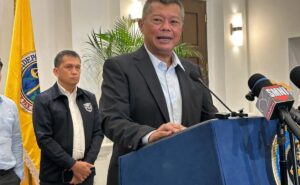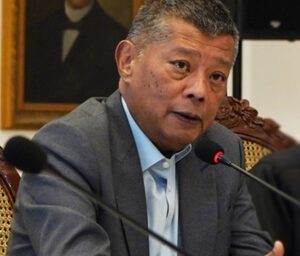MANILA, PHILIPPINES — Acting Ombudsman Boying Remulla has wasted no time in his new role, immediately setting off a political and social media firestorm with his declaration that his immediate priority is to investigate corruption cases tied to flood control projects. He emphasized the crucial need to focus on projects plagued by severe anomalies to ensure public funds are directed to their rightful purposes.

His announcement has caused considerable surprise, particularly among supporters of the former administration, due to his specific focus on Davao projects allegedly affected by missing funds amounting to a staggering ₱52 billion. This sector has long been criticized for its lack of transparency and systemic corruption. The reaction from the pro-Duterte camp (DDS) on social media has been one of skepticism and query: why is Remulla prioritizing flood control and not other issues or figures linked to the powerful Duterte family?
A Determined Stance on Accountability
Remulla acknowledged the difficulty of the situation but asserted that resolution is possible through focused, direct attention to the cases. He projected that trials could be completed within three to four months without interruption, driven by his conviction that the Philippines is not inherently poor, but crippled by corruption. “If all the money currently being stolen were channeled into the right projects, our economy would flourish,” Remulla stated.
He also directly addressed the perceived failures of his predecessor, former Ombudsman Samuel Martires, who he suggested had dismantled lifestyle checks and suppressed certain records regarding politicians. Remulla claimed that numerous cases were shelved, providing protection for powerful individuals. His immediate goal is to restore integrity to the office and ensure that all anomalies are addressed swiftly.
Remulla is acutely aware that this task will be challenging. He stressed the need for direct case supervision and a relentless investigation pace. Crucially, he affirmed that even the Duterte name would not shield anyone from prosecution if corruption is proven. Despite intense criticism and harassment on social media, Remulla remains firm in his position that no one is above the law.

Expanding Investigations and Warning Politicians
As the investigation gains traction, the Integrity and Corruption Investigation (ICI) is reportedly recommending charges against numerous political figures, including congressmen and senators. The Ombudsman’s office plans to issue lookout bulletins to prevent those involved from fleeing the country. Remulla noted that all ICI requests are backed by strong evidence, and some individuals have already admitted to anomalies. The scrutiny also extends to prominent figures in the entertainment industry.
Furthermore, Remulla highlighted the importance of strict incarceration for convicted politicians. He suggested that jail time should not resemble a “vacation,” but should involve genuine hardship—such as the lack of air conditioning, overcrowding, and strict conditions—to serve as a true deterrent. He pointed to instances of former senators and congressmen who were able to maintain social media presence while imprisoned, arguing that punishment must include discipline.
The Ombudsman is also focusing on transparency regarding the luxury assets and wealth of public figures, including expensive jewelry, vehicles, and other properties. He cited one example of a ₱300 million necklace and a ₱15 million ring under investigation. The office’s objective is to shine a light on such unexplained wealth and hold the perpetrators accountable.
The political discourse is also weighing in on the eventual appointment of a permanent Secretary of Justice, with names like former Senator Leila de Lima and other former officials circulating. Regardless of the ongoing political debates, Remulla remains committed to his focus on immediate action against corruption, rather than mere political maneuvering.
In sum, Boying Remulla’s leadership signals a clear commitment to restoring integrity and justice in government offices. His determination to prioritize flood control and other major anomalies demonstrates a serious, proactive step against systemic corruption. Despite anticipated challenges, he remains committed to ensuring that public funds are utilized for the collective benefit of the Filipino people, not for the gain of the powerful few. The coming months are expected to deliver rapid progress, potential convictions, and a clear message: corruption in the Philippines is no longer safe from the long arm of the law.





